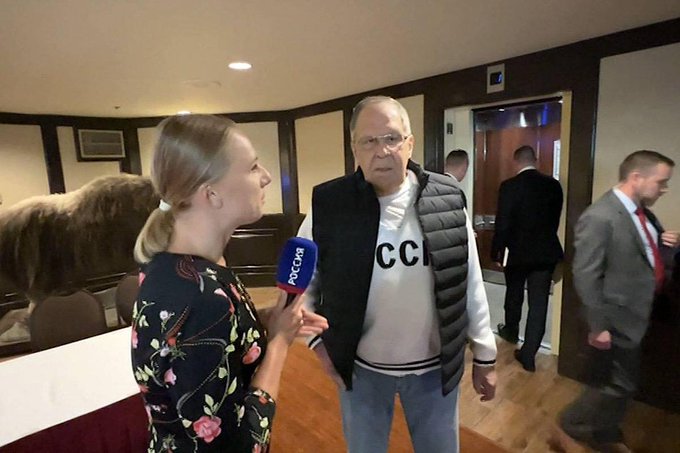Photograph Source: @shanghaidaily – x.com
Russian Foreign Minister Sergei Lavrov wore a sweatshirt to the recent Alaska summit that vividly displayed his nostalgic imagination. Written in large Cyrillic letters was “CCCP” or USSR. Like Donald Trump’s red cap featuring the slogan “Make America Great Again,” Lavrov indicated that he, like Vladimir Putin, imagined the Russian Federation returning to its past glory as the Soviet Union. The 70-year-old leaders of the United States and Russia are in time warps. Geopolitics exists in linear time. Countries, like individuals, cannot return to their past glories in circular time.
Nostalgia for the past can be an obsession. I’m no exception. Each season I closely follow the results of the New York Yankees and the New York Knicks to see if they can repeat their past glories. (They have not won major championships since 2009 and 1973, respectively.) Mine is not a simple optimism about the Yankees and Knicks winning games; it is an optimism about the teams returning to their former championship status.
Now it is one thing to imagine a sports team returning to a past dominant position, it’s quite another to imagine a country returning to its past hegemonic role. Can countries or empires which were once dominant return to those previous situations? While sports seasons repeat the same number of games and similar formats to win the ultimate title, geopolitics evolves in time with no similar set of rules or formats. Baseball and basketball have regulated rules and procedures; geopolitics does not.
I know what the Yankees and Knicks need to do to win the World Series and NBA crown. I don’t know what has to happen for the Russian Federation to return to the glory of the Soviet Union. Or for the United States to be truly great again.
Edward Gibbon’s The History of the Decline and Fall of the Roman Empire and Paul Kennedy’s The Rise and Fall of Great Powers present similar temporal perspectives. Both describe how empires/hegemons rose and fell. Lavrov’s sweatshirt, and Trump’s omnipresent cap represent a different temporal perspective. Lavrov/Putin and Trump imagine that their empires/hegemons rose, fell, and will rise again.
When President Putin remarked in the post-summit that “a fair balance in the security sphere in Europe and the world as whole must be restored,” the emphasis was on restored. He implied that that is “the root causes” of the crisis with Ukraine. Putin’s nostalgic imagination is that the post 1945 Soviet Union’s regional hegemony and global power should be restored.
Trump’s cap says much the same. The American hegemonic rise also happened after World War II. The Vietnam War – if one needs a specific starting point – saw the decline of the United States. Trump’s cap’s slogan promises that he will return the U.S. to its post 1945 dominant position. When DJT says “Make America Great Again,” the emphasis is on Again.
Instead of linear time moving forward with new technologies and new geopolitics, Lavrov, Putin, and Trump imagine circular time going back to something that was before. Restored and Again are the keywords. So just as sports team repeat how the game is played, the nature of the schedule and the criteria for becoming champions, Lavrov, Putin, and Trump see geopolitics as circular in time as well.
But geopolitics and sports are not the same. European countries like Spain, Portugal, France, England, and the Netherlands all had their historic periods of geopolitical glory. They all had extraterritorial moments of domination. Today, none of their leaders envisions a return to that position. (The British Commonwealth of Nations is not the same as when “the Sun Never Set on the British Empire.”)
Sports teams can return to their previous glory. Individual athletes, politicians, and movie stars may make comebacks; empires/hegemons cannot.
And who is imagining a return to past glory? Sergei Lavrov is 75 years-old, Vladimir Putin 72 years-old, and Donald Trump is 79 years-old. All three are caught in the same nostalgic imagination. All three aging leaders project their temporal decline on a geopolitical imagination of a return to their countries’ past glories under their leadership. All three are caught in the same nostalgic time warp.
Individually, we would all like to remain young and healthy. We would all like to de-age and increase our longevity. Botox, plastic surgery, injections, exercise and pills are all part of that effort to counter linear time. Pictures of Putin’s physical prowess are regularly presented to defy his 72 years. Trump loves to show himself energetically playing golf; he often mocked Joe Biden’s age when he himself was in his late 70s. His favorite songs, the oldies but goodies his staffers play when he is in a bad mood, are “Memory” from Cats, and the Rolling Stones’ “You Can’t Always Get What You Want.”
Lavrov/Putin and Trump have taken the personal narrative of countering aging to a nostalgic, geopolitical level. 70 year-old men’s desires to maintain their youth has become part of a larger geopolitical narrative. Science may have succeeded in the de-extinction of the dire wolf, but there is no indication it will succeed with infinitely prolonging human longevity or restoring a country’s empire. Empires/hegemons rise and fall; they do not rise again. History may repeat itself in different forms, but geopolitics does not. Nostalgia for the past has its limits. And seventy year-old men should act their ages.
The post Sergei Lavrov’s Sweatshirt and Putin/Trump’s Nostalgic Imaginations appeared first on CounterPunch.org.
From CounterPunch.org via this RSS feed




